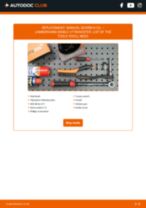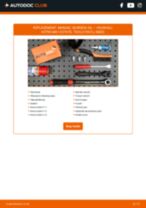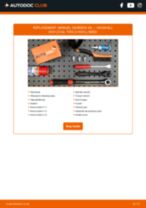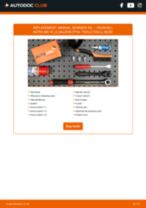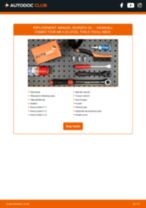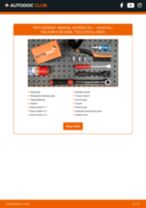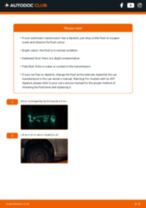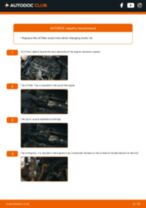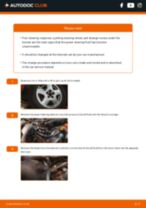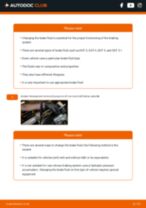Manuals and tips on repair and maintenance for Oils and Fluids
Oils and Fluids parts replacement: Step-by-step manuals
Want to get more useful information?  Ask on the forum
Ask on the forum
Ask questions or share your repair experience on the car forum. Subscribe to updates so you don't miss out on new guides.
Oils and Fluids: replacement and repair guides
Oils and Fluids: Most viewed car repair video tutorials
Gearbox Oil and Transmission Oil
Go to section
 How to change transmission oil on the OPEL ASTRA G CC (F48, F08) [TUTORIAL AUTODOC] problem-solving
How to change transmission oil on the OPEL ASTRA G CC (F48, F08) [TUTORIAL AUTODOC] problem-solving How to change transmission oil / gear oil on SKODA FABIA 1 (6Y5) [TUTORIAL AUTODOC]
How to change transmission oil / gear oil on SKODA FABIA 1 (6Y5) [TUTORIAL AUTODOC] How to change transmission oil / gear oil on VW TRANSPORTER 4 (T4) [TUTORIAL AUTODOC]
How to change transmission oil / gear oil on VW TRANSPORTER 4 (T4) [TUTORIAL AUTODOC]
Automatic Transmission Fluid
Go to section
 How to change automatic transmission fluid | AUTODOC tips
How to change automatic transmission fluid | AUTODOC tips
Engine Oil
Go to section
 How to change the engine oil and oil filter on a car | Tips from AUTODOC
How to change the engine oil and oil filter on a car | Tips from AUTODOC How to change oil filter and engine oil on BMW 3 (E90) [TUTORIAL AUTODOC]
How to change oil filter and engine oil on BMW 3 (E90) [TUTORIAL AUTODOC] How to change Engine Oil and oil filter on BMW X3 E83 TUTORIAL | AUTODOC
How to change Engine Oil and oil filter on BMW X3 E83 TUTORIAL | AUTODOC How to change engine oil and oil filter on BMW X5 E53 TUTORIAL | AUTODOC
How to change engine oil and oil filter on BMW X5 E53 TUTORIAL | AUTODOC How to change Engine Oil and Oil filter on FORD FOCUS 2 TUTORIAL | AUTODOC
How to change Engine Oil and Oil filter on FORD FOCUS 2 TUTORIAL | AUTODOC How to change oil filter and engine oil on BMW E46 [TUTORIAL AUTODOC]
How to change oil filter and engine oil on BMW E46 [TUTORIAL AUTODOC] How to change Engine Oil and Oil filter on BMW 3 E36 TUTORIAL | AUTODOC
How to change Engine Oil and Oil filter on BMW 3 E36 TUTORIAL | AUTODOC How to change oil filter and engine oil on CITROËN C5 Estate [TUTORIAL AUTODOC]
How to change oil filter and engine oil on CITROËN C5 Estate [TUTORIAL AUTODOC]
Power Steering Fluid
Go to section
 Changing the power steering fluid | AUTODOC tips
Changing the power steering fluid | AUTODOC tips
Antifreeze
Go to section
 How to change engine thermostat on PEUGEOT 207 [TUTORIAL AUTODOC]
How to change engine thermostat on PEUGEOT 207 [TUTORIAL AUTODOC] Thermostat replacement on a VW PASSAT B7 saloon – problem-solving [TUTORIAL AUTODOC]
Thermostat replacement on a VW PASSAT B7 saloon – problem-solving [TUTORIAL AUTODOC] How to change engine thermostat on VW GOLF 4 [TUTORIAL AUTODOC]
How to change engine thermostat on VW GOLF 4 [TUTORIAL AUTODOC] How to change engine thermostat on VW GOLF 2 [TUTORIAL AUTODOC]
How to change engine thermostat on VW GOLF 2 [TUTORIAL AUTODOC] How to change engine thermostat on BMW E36 [TUTORIAL AUTODOC]
How to change engine thermostat on BMW E36 [TUTORIAL AUTODOC] How to change engine thermostat on AUDI A4 B5 Saloon [TUTORIAL AUTODOC]
How to change engine thermostat on AUDI A4 B5 Saloon [TUTORIAL AUTODOC] How to change engine thermostat on OPEL MERIVA A [TUTORIAL AUTODOC]
How to change engine thermostat on OPEL MERIVA A [TUTORIAL AUTODOC] How to change engine thermostat on BMW E39 Touring [TUTORIAL AUTODOC]
How to change engine thermostat on BMW E39 Touring [TUTORIAL AUTODOC]
Brake Fluid
Go to section
 How to change brake fluid [AUTODOC TUTORIAL]
How to change brake fluid [AUTODOC TUTORIAL]
Oils and Fluids: Top repair guides
Gearbox Oil and Transmission Oil
Go to section
Automatic Transmission Fluid
Go to section
Engine Oil
Go to section
Power Steering Fluid
Go to section
Brake Fluid
Go to section
Lifehacks from AUTODOC CLUB
 Which Coolant is Best? Comparison Test | AUTODOC
Which Coolant is Best? Comparison Test | AUTODOC How to replace a timing chain yourself
How to replace a timing chain yourself 5 tools that make car repair incredibly simple | AUTODOC tips
5 tools that make car repair incredibly simple | AUTODOC tips How to restore a steering wheel | AUTODOC tips
How to restore a steering wheel | AUTODOC tips
Unlock your car maintenance assistant!
Track expenses, manage logs, schedule replacements, and more.
Common questions about changing oils and fluids
AUTODOC's car repair and service guides
Latest articles
Go to blog
- 21.04.20225w30 or 5w40: which engine oil is better to use in winterView more

Time to replace parts? Get even better deals in our Shop app.

SCAN ME








